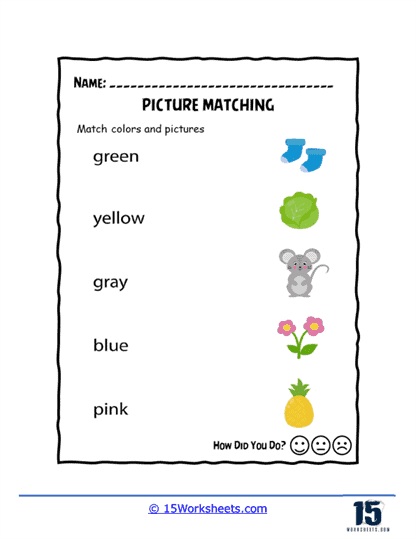Picture Matching Worksheets
All About These 15 Worksheets
Preschool is a critical period in a child’s development marked by rapid cognitive growth and the acquisition of foundational skills. Engaging activities that promote cognitive development, observation skills, and early learning are essential for laying a strong foundation for future academic success.
This collection of Picture Matching worksheets for preschool students provides a valuable resource for educators and parents to engage children in interactive learning experiences that not only stimulate cognitive growth but also foster visual discrimination, critical thinking, and problem-solving abilities. These worksheets offer an enjoyable approach to learning that encourages curiosity and exploration, setting the stage for a lifelong love of learning.
What are Picture Matching Worksheets?
Picture matching worksheets are educational materials designed to help children develop visual perception and problem-solving skills. These worksheets typically consist of a grid or set of rows and columns with pictures or images placed in different cells. The objective is for children to match or pair the pictures that are identical or related to each other based on a given criterion.
In these worksheets, children are presented with sets of pictures, and they need to identify and match the pictures that are exactly the same. For example, they may be given a grid with pictures of different animals, and they have to find and connect the two pictures of the same animal.
They require children to match pictures that are related to each other based on a specific criterion. For instance, they may be given a grid with pictures of fruits and a separate grid with their corresponding names. The task is to match each fruit picture with its correct name.
By engaging with these worksheets, children enhance their visual discrimination skills. They learn to identify similarities and differences between pictures, improving their ability to distinguish and recognize visual patterns. They also promote critical thinking and problem-solving abilities. Children need to analyze the pictures, identify relationships or similarities, and make connections to complete the matching task.
When completing these types of activities, children often need to use their fine motor skills to draw lines, connect dots, or manipulate small pieces. These activities help develop hand-eye coordination and fine motor control.
Benefits Of Picture Matching Worksheets To Preschool Students
The collection of Picture Matching worksheets offers numerous advantages to preschool students:
- Cognitive Development: Engaging in picture matching activities stimulates cognitive growth, enhancing memory, analytical thinking, and problem-solving abilities.
- Visual Discrimination: Completing picture matching tasks improves visual discrimination skills, helping children differentiate between objects, shapes, and patterns.
- Early Learning Readiness: Picture matching exercises prepare children for more advanced learning by introducing foundational concepts such as categorization and classification.
- Language Development: Describing and discussing the images they are matching promotes vocabulary development and communication skills.
- Critical Thinking: Completing picture matching worksheets encourages critical thinking as children analyze and identify similarities and differences between images.
This collection of Picture Matching worksheets for preschool students serves as a valuable educational tool that nurtures cognitive development, visual discrimination, critical thinking, and early learning readiness through interactive and engaging exercises. These worksheets provide an enjoyable way for young learners to explore and understand the world around them while honing essential cognitive and observational skills.
Additionally, picture matching activities promote language development, communication skills, and creativity, setting a strong foundation for future academic success in reading, mathematics, and problem-solving. By incorporating these worksheets into early education, educators and parents can inspire a lifelong love for learning, stimulate cognitive development, and equip children with the skills and knowledge they need for future academic achievements and personal growth.















